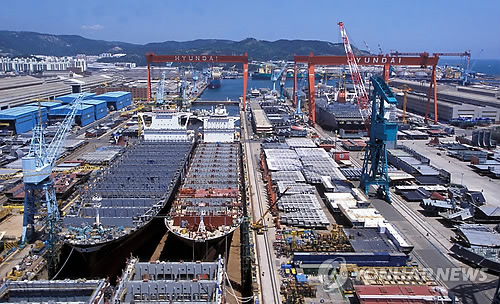Restructuring in the struggling Korean shipbuilding industry is in full swing, with shipyards set to push their self-restructuring schemes after receiving the go ahead from creditors.
Among the nation’s top three shipbuilders, Hyundai Heavy Industries and Samsung Heavy Industries received approvals from their respective creditors for their debt restructuring proposals last week. Daewoo Shipbuilding & Marine Engineering is awaiting its key lender’s green light.
Among the nation’s top three shipbuilders, Hyundai Heavy Industries and Samsung Heavy Industries received approvals from their respective creditors for their debt restructuring proposals last week. Daewoo Shipbuilding & Marine Engineering is awaiting its key lender’s green light.

Daewoo Shipbuilding is in the final stage of negotiations with its main creditor Korea Development Bank to gain support for its self-rescue plan worth some 3.4 trillion won ($2.86 billion).
Daewoo Shipbuilding was supposed to get a nod from creditors at the end of May, based on results of a stress test completed around the time.
But the two parties have not come up with a finalized plan so far because of a drop in new orders this year, which further squeezes the shipbuilder’s balance sheet.
“The creditor may confirm the plan this week at the earliest,” a source said.
On May 29, the shipyard submitted its debt restructuring measures which aim to secure liquidity by cutting 2,300 employees and selling assets including two floating docks.
With the latest measure, the shipyard has drawn up self-rehabilitation plans worth 5.26 trillion won since last October when it mapped out a 1.85 trillion-won program in return for 4 trillion won in financial aid.
Samsung Heavy seeks to roll over 250 billion won debt maturing in June, from commercial lenders like KB Kookmin Bank and Shinhan Bank.
According to industry sources, Samsung Heavy’s main lender Korea Development Bank is expected to extend the maturity of 600 billion won of debts. But KB and Shinhan have not decided whether they will roll the debt over.
If creditors agree on the bailout plan, the shipbuilding arm of Samsung Group will be able to speed up sales of its noncore assets such as the Pangyo R&D Center and Samsung Hotel Geoje to raise cash.
“Success or failure of the debt maturity extension will become a chance to see the market’s view on the plan whether financial firms think that the scheme is sufficient or not,” a source said.
The country’s three largest shipbuilders closed 2015 with combined losses of more than $6 billion due to a trade slowdown, a glut of vessels and low freight rates hitting the global shipping industry.
Hyundai Heavy has mapped out 3.5 trillion won worth of self-rehabilitation measures, including asset sales and workforce reduction, in order to stay afloat amid a drop in new orders.
Under the shipbuilder’s self-rescue plans, which are temporarily approved by the financial authorities and its creditors led by KEB-Hana Bank, it will sell noncore assets, including shares in companies that it has invested in, and cut its workforce, which will reduce its debt-to-equity ratio to below 100 percent by 2018.
By Park Han-na (hnpark@heraldcorp.com)
-
Articles by Korea Herald



![[AtoZ into Korean mind] Humor in Korea: Navigating the line between what's funny and not](http://res.heraldm.com/phpwas/restmb_idxmake.php?idx=644&simg=/content/image/2024/04/22/20240422050642_0.jpg&u=)

![[Exclusive] Korean military set to ban iPhones over 'security' concerns](http://res.heraldm.com/phpwas/restmb_idxmake.php?idx=644&simg=/content/image/2024/04/23/20240423050599_0.jpg&u=20240423183955)

![[Herald Interview] Why Toss invited hackers to penetrate its system](http://res.heraldm.com/phpwas/restmb_idxmake.php?idx=644&simg=/content/image/2024/04/22/20240422050569_0.jpg&u=20240422150649)
![[Graphic News] 77% of young Koreans still financially dependent](http://res.heraldm.com/phpwas/restmb_idxmake.php?idx=644&simg=/content/image/2024/04/22/20240422050762_0.gif&u=)







![[Exclusive] Korean military to ban iPhones over security issues](http://res.heraldm.com/phpwas/restmb_idxmake.php?idx=652&simg=/content/image/2024/04/23/20240423050599_0.jpg&u=20240423183955)



![[Today’s K-pop] Ateez confirms US tour details](http://res.heraldm.com/phpwas/restmb_idxmake.php?idx=642&simg=/content/image/2024/04/23/20240423050700_0.jpg&u=)